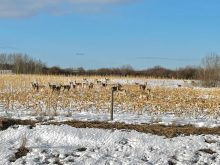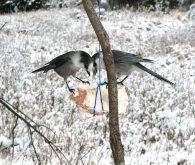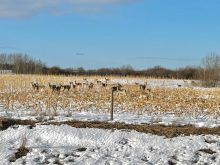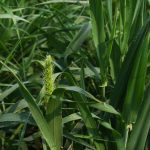Increased funding will allow more and quicker testing of animals for chronic wasting disease and will allow the hiring of more staff, including an additional wildlife biologist, according to the Manitoba government.
“Chronic wasting disease is a significant threat to the health of Manitoba’s wildlife and our collective efforts in conservation,” Greg Nesbitt, minister of natural resources and northern development, said in a July 19 press release.
The province announced $880,000 in new funding for programs related to stopping the spread of the prion disease, commonly shortened to CWD. The cash was previously promised in the 2023 provincial budget.
Read Also

KAP flags risky trade for Manitoba farmers
Tariffs, market access uncertainty, trade diversification and export infrastructure top the agenda at Keystone Agricultural Producers (KAP) annual meeting.
The extra funding will cover more testing capacity, additional surveillance and monitoring and bolstering staffing levels, the news release said.
Labs testing for CWD were pushed to their limits in 2022 following the fall deer hunting season. The government had implemented more robust testing requirements and guidelines that year for hunted deer, elk and moose, due to continued CWD findings in the province. It was also the first year that Manitobans could hunt for mule deer, also following the spread of the disease.
The province had been considered CWD-free until late 2021, when the disease was detected in a mule deer in western Manitoba. By December 2022, at least seven cases had been confirmed, all in mule deer. This led the province to open a winter hunting season for mule deer.
According to the province’s CWD testing page, hunters could expect to wait between 16 and 20 weeks to learn test results due to the influx of samples.
In March 2023, the province announced it had detected its first case in a whitetail deer.
The total number of confirmed cases stands at 22, the July 19 release said. The province said that, as more testing is completed, more cases are likely to be confirmed.
CWD is an incurable, fatal neurological disease that affects members of the deer family and is related to BSE. While it’s not known as a human health risk, consuming meat from an infected animal isn’t recommended.
Nesbitt said testing more animals more often is crucial to staying on top of the disease.
“This additional investment will expand testing capacity, with a goal of reducing processing times for the 2023 hunting season,” he said.
The 2022-23 hunting season saw up to 6,000 samples submitted, compared to an average of 1,000 before CWD was discovered in Manitoba. The province said it’s reviewing surveillance programing efforts to simplify sample and data submission, streamline sample processing and provide more opportunities for hunters to engage in the program.
Testing is mandatory for licensed hunters in areas where CWD is a concern. Hunters are also urged to practise safe carcass-handling protocols and avoid consumption of any animal that has tested positive for CWD, the province added.
“Manitoba hunters take chronic wasting disease and its prevention seriously,” said Carly Deacon, directing manager of the Manitoba Wildlife Federation. “The increased funding and staffing levels will certainly assist with improving the CWD surveillance programs.”














